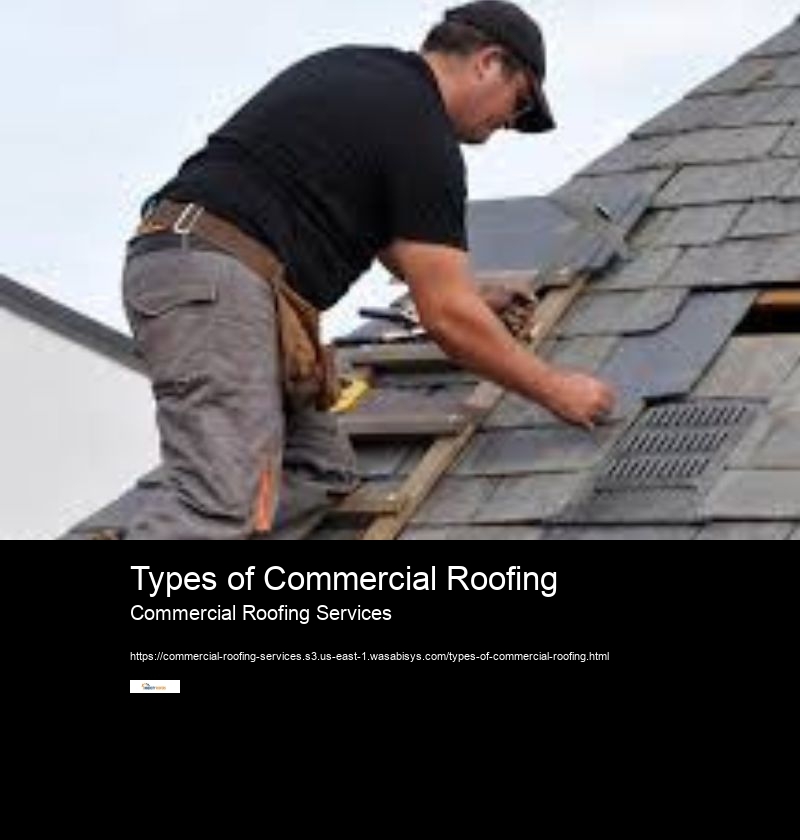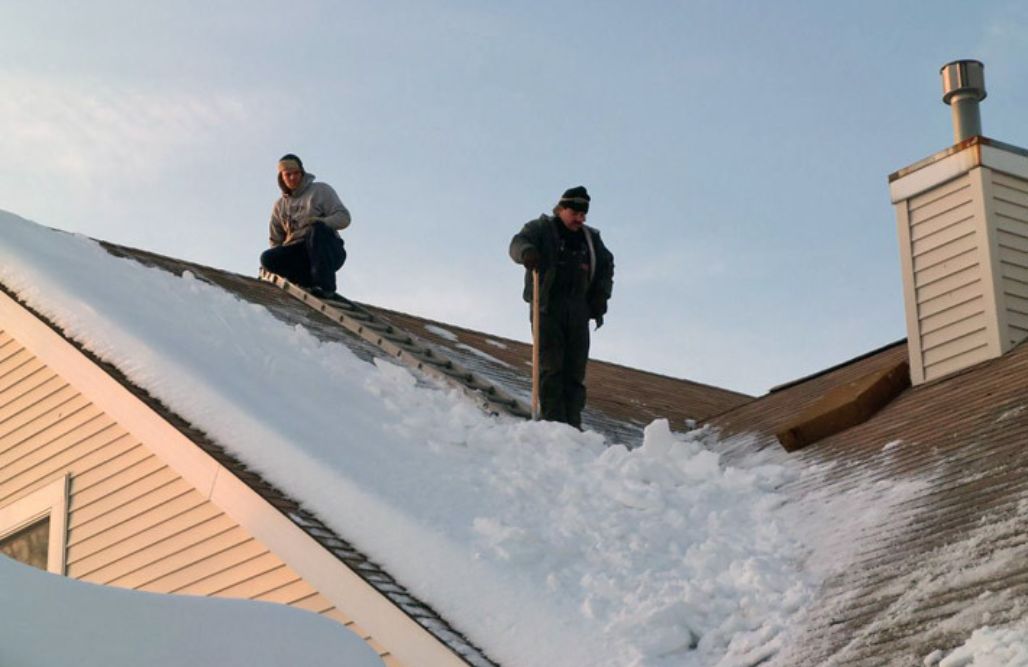Types of Commercial Roofing
What are the key benefits of using commercial roofing services for your property?
How Do Ventilation and Insulation Affect Roof Functionality?
Proper ventilation and insulation significantly impact the functionality and efficiency of a roof.
Roof Ventilation: Adequate roof ventilation allows air circulation, preventing the buildup of heat and moisture. This prevents damage to the roof, reduces the risk of mold and mildew, and improves energy efficiency.
Roof Insulation: Proper insulation helps regulate indoor temperature, reducing heating and cooling costs and preventing ice dams and condensation issues.
Roof Energy Efficiency: Proper ventilation and insulation contribute to better energy efficiency, maintaining a comfortable indoor environment and reducing energy consumption.

How can unique roof architectural structures enhance the appearance and functionality of a commercial building?
Roof Condensation: Good ventilation and insulation minimize the risk of condensation, which can lead to water damage and mold growth.
Proper Attic Ventilation: A well-ventilated attic helps maintain the roof's temperature and prevents excessive heat buildup in the summer.
What is the Roof Moisture or Humidity Threshold to Prevent Roof and Deck Damage?
Excessive moisture and humidity can cause significant damage to a roof and deck. The moisture or humidity threshold varies depending on several factors:
Roof Mold Growth: Moisture levels that promote mold growth should be avoided, as mold can lead to structural damage and health issues.
- https://commercial-roofing-services.s3.us-east-1.wasabisys.com/index.html
- https://commercial-roofing-services.s3.us-east-1.wasabisys.com/commercial-roofing-services.html
- https://commercial-roofing-services.s3.us-east-1.wasabisys.com/unique-roof-architectural-structures.html
- https://commercial-roofing-services.s3.us-east-1.wasabisys.com/types-of-commercial-roofing.html
- https://commercial-roofing-services.s3.us-east-1.wasabisys.com/roof-installation-and-replacement.html
- https://commercial-roofing-services.s3.us-east-1.wasabisys.com/leak-detection-and-repair.html
- https://commercial-roofing-services.s3.us-east-1.wasabisys.com/roof-coating-and-waterproofing.html
- https://commercial-roofing-services.s3.us-east-1.wasabisys.com/privacy-policy.html
- https://commercial-roofing-services.s3.us-east-1.wasabisys.com/sitemap.html
- https://commercial-roofing-services.s3.us-east-1.wasabisys.com/sitemap.xml
- https://commercial-roofing-services.s3.us-east-1.wasabisys.com/about-us.html
- https://commercial-roofing-services.s3.us-east-1.wasabisys.com/feed.xml
Comprehensive Guide to Commercial Roofing Services: Installation, Types, and Maintenance
- Commercial roofing services include installation, repair, and maintenance of rooftops on commercial buildings, requiring skilled professionals and thorough inspections.
- Different roofing systems, such as slope roofs, built-up roofs (BUR), metal roofs, flat roofs, and thermoplastic olefin roofs (TO), cater to diverse commercial building needs.
- Working with reputable roofing experts ensures structural integrity, longevity, and protection of valuable assets within the building.
- Commercial and residential roofing services differ in complexity, materials, maintenance, and installation costs.
- The Built-Up Roof (BUR) system offers durability and weather resistance, while Modified Bitumen (MB) roofs provide enhanced durability and weather resistance.
- Thermoplastic Polyolefin Roofing (TPO) and Ethylene Propylene Diene Terpolymer (EPDM) offer energy efficiency and durability.
- Advantages of EPDM roofing include its eco-friendliness, simple installation, ease of maintenance, and durability.
- Metal roofing systems are versatile, durable, and sustainable, offering long lifespans and enhancing the building's aesthetics.
- A professional roofing contractor inspects and assesses roofs based on age, condition, water damage, structural integrity, ventilation, and insulation.
- Adequate ventilation and insulation are crucial for roof functionality, preventing condensation, ice damming, and promoting energy efficiency.
- To make a deck last a lifetime, proper installation, waterproofing, good maintenance, and quality materials are essential.
- Managing moisture and humidity thresholds effectively prevents roof and deck damage, such as mold growth, sagging, and rot.
- The steps to waterproof and protect a deck include cleaning, inspection, applying a waterproofing membrane and sealant, installing proper drainage, and regular maintenance.
Citations and other links
- https://www.bahtlist.com/holland-pa/construction/inner-city-roofers
- http://businesseshq.com/directory/listingdisplay.aspx?lid=42226
- https://www.housetohomepros.com/holland-pa/roofing-1-1/inner-city-roofers
- http://www.localhomeservicepros.com/holland-pa/roofing/inner-city-roofers
- https://www.successcenter.com/pennsylvania/holland/services/inner-city-roofers
- https://www.fixerhub.com/home-service/inner-city-roofers
- https://www.gofind247.com/top/inner-city-roofers
What are the different types of commercial roofing materials available in the market?
Roof Deck Sagging: Elevated moisture levels can weaken the roof deck, leading to sagging and reduced structural integrity.
Roof Condensation: Preventing condensation on the roof and deck is crucial to avoid rot and water damage.
Roof Deck Rot Decay: Moisture levels conducive to decay can lead to the deterioration of the roof deck.
Roof Ice Damming: High moisture and freezing temperatures can result in ice dams, leading to leaks and water infiltration.
Maintaining moisture and humidity levels within acceptable limits through proper ventilation and insulation helps prevent these issues and protects the roof and deck from damage.

What factors should be considered when choosing a commercial roofing system?
What Are the Steps to Waterproof and Protect the Deck?
Waterproofing and protecting a deck require careful attention to detail and a systematic approach. Here are the steps involved in ensuring the deck remains in good condition and protected from water damage:
Roof Deck Cleaning: Thoroughly clean the deck to remove dirt, debris, and contaminants.
Roof Deck Inspection: Inspect the deck for signs of damage, such as cracks or rot, and address any issues.
Roof Waterproofing Membrane: Apply a high-quality waterproofing membrane to seal the deck and protect it from water infiltration.
What steps are involved in the roof installation and replacement process for commercial buildings?
Roof Sealant: Apply a sealant to fill any gaps or cracks in the deck, enhancing its waterproofing capabilities.
Roof Drainage System: Ensure the deck has a proper drainage system in place to direct water away from the structure.
Roof Flashing Installation: Install flashing around edges and joints to further prevent water penetration.
Regular Roof Maintenance: Schedule regular inspections and maintenance to detect and address any potential issues early on.
By following these steps, a roofer can ensure the deck remains in excellent condition and protected from water damage and other forms of deterioration.
How can leak detection and repair services help prevent damage to a commercial roof?
Commercial roofing services encompass a range of expert solutions dedicated to the installation, repair, and maintenance of rooftops on commercial buildings. These comprehensive services include the proper and skillful installation of rooftops, ensuring that the foundation is solid and secure. A critical aspect of these services involves conducting thorough inspections to identify any existing issues or potential weaknesses in the commercial roofs.
When roof weaknesses are detected, experienced roofing professionals take prompt action to address the problems. This can involve fixing roof leaks, which are not only detrimental to the structure but also disruptive to the daily operations of the business. Additionally, for worn-out rooftops, the roof lining may need to be replaced, guaranteeing that the building remains adequately protected.
Commercial roofing services encompass various roofing systems that are tailored to the unique needs of commercial buildings. Some of the popular systems include slope roofs, which are well-suited for shedding rainwater efficiently, and built-up roofs (BUR) known for their durability and weather resistance. Metal roofs offer longevity and low maintenance, while flat roofs provide an ideal platform for rooftop equipment installations. Another option is thermoplastic olefin roofs (TO), known for their energy efficiency and environmental benefits.
The execution of commercial roofing services demands the expertise and equipment possessed by skilled roofing experts and contractors. These professionals possess practical experience and hold professional certifications, assuring the highest level of competence and proficiency. Collaborating with roofing experts is paramount, as they prioritize safety and efficiency throughout the roofing project, ensuring that the building and its occupants remain safeguarded during and after the process.
In addition to the core roofing services, commercial roofing projects may involve supplementary elements such as roof coatings to enhance durability and waterproofing properties. Adequate ventilation and insulation are also essential to maintain a comfortable indoor environment and reduce energy consumption, factors that roofing experts carefully consider during the project.
Types of Commercial RoofingWhat are the common causes of roof leaks in commercial properties, and how can they be addressed?
Engaging roofing professionals offers multiple benefits to commercial property owners. Firstly, their expertise ensures that the roofing system exhibits structural integrity and longevity, providing peace of mind and saving potential costs on extensive repairs down the line. Moreover, working with reputable roofing companies typically comes with the best warranty and insurance coverage, safeguarding the investment in the building.
The hallmark of commercial roofing services lies in the commitment to top-quality workmanship. By adhering to industry standards and employing the best practices, roofing experts ensure that the completed project meets or exceeds the client's expectations. For commercial property owners, partnering with reliable roofing professionals guarantees a robust and durable rooftop that withstands the elements and protects the valuable assets housed within the building.
Residential and commercial roofing services share some common features, but they also exhibit distinct differences in design, materials, maintenance, and installation costs. Let's delve into these disparities more comprehensively.
One prominent dissimilarity between residential and commercial roofing lies in the size and complexity of the roofing systems. Commercial properties typically have larger roofs, necessitating more materials, specialized equipment, and a higher level of expertise during installation, maintenance, and repairs due to the increased square footage and weight.
Moreover, the frequency and approach to roof inspections vary significantly between residential and commercial roofs. Commercial roofs require more regular inspections to ensure their integrity and longevity. Skilled professionals with experience in commercial roofing conduct these inspections, promptly identifying potential issues and recommending appropriate solutions.
Why Should Holland Roofing Hire Roofers from the City?
Why should Holland Roofing choose Innercity Roofers?
When you replace or fix your roof, you have to make a big choice. Even though the weather in Holland is rough, we will protect your house from hail storms and other bad weather. Your roof is a very important part of keeping your home safe from things like high winds, fire hazards, and lightning.
If you are ready to get started or have any other questions, our team is ready to help! Just pick up the phone to get answers to your questions and a fair price quote for your roof.